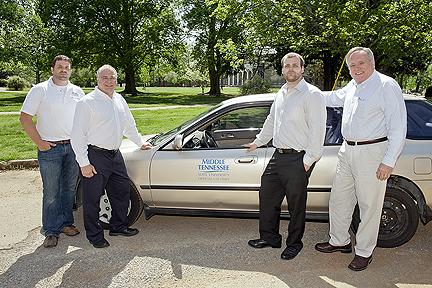
We love electric vehicles, but with many battery-powered and plug-in hybrids sporting sticker prices north of $30,000, they have a tendency to be pretty darn expensive and out of reach for the average consumer. Throw in limited availability in many states and a growing but sparse network of charging stations, and so far the adoption of the modern EV has been slow to spark.
But while we wait for manufacturers to figure out how to drive production costs down and a more robust infrastructure begins to take shape, a group of students led by Dr. Charles Perry, a former IBM employer, at Middle Tennessee State University are taking matters into their own hands. That’s right; the industrious group is hard at work developing a plug-in electric hybrid kit that could ultimately cost consumers far less to convert their existing vehicles than it would to purchase a native EV and boost fuel economy by as much as 100 percent.
The entire system is currently being tested on a 1994 Honda station wagon and involves a trunk-mounted lithium-ion battery feeding power to an electric motor. In turn, this motor supplies power to both rear wheels while alleviating the gasoline engines workload up front, which, thanks to the aforementioned electric motor, is only tasked with sending power to the front two wheels of this veteran Honda.
According to the university, Perry and his students are currently pitching the idea to various companies in the hopes of getting additional funding for a production version of the plug-in hybrid kit that could cost as little as $3,000. In 2009, Perry won a green energy competition from the Tennessee Technology Development Corp., and was the recipient of a $50,000 grant along with a matching investment to spur the project forward.
Could utilizing a plug-in hybrid electric kit really take off and resonate with consumers looking to explore alternative drive trains? We think so. For that kind of money and boost in fuel economy, the idea of retrofitting your existing car becomes more than just attractive — it becomes possible.


